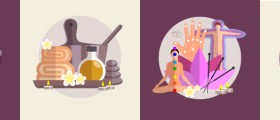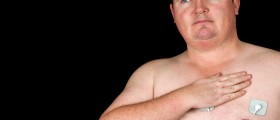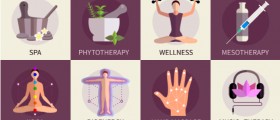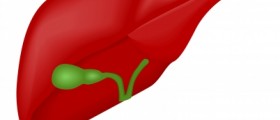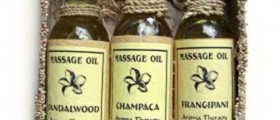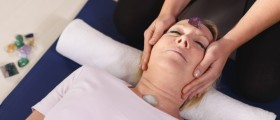"Alternative medicine" really refers to healing discipline outside of modern, allopathic, science-based, medicine. It covers an almost incomprehensibly broad spectrum of different disciplines, some of which are more evidence-based than others. You'll probably immediately think of things like acupuncture, Ayurveda, Traditional Chinese Medicine, and chiropractic, but Wikipedia's long list of forms of alternative medicine likewise features things such as journaling, art therapy, and meditation — things that can certainly have health benefits but which I'd personally not consider to be "medicine" as such. It covers things that have been proven to be inherently dangerous — like the administration of colloidal silver or black salve — as well as those that don't officially have any effect at all.

The Risks Of (Amateur) Alternative Medicine Treatments With No Clear Physical Impact
By this, I mean practices during which nothing particular is administered (goes into your body in any way) and nothing particular is done to your physical body either. Such therapies may have many proven health benefits or none at all, but won't directly harm your physical health if they are practiced or overseen by someone unqualified.
This would include reiki, wherein the practitioner apparently channels energy into the "patient", as well as meditation, tai chi, art therapy, animal-assisted therapy (think prisoners or nursing home patients keeping pets, among other things), and music therapy.
If you receive any of these treatments from an unqualified practitioner, you will neither break any bones nor be poisoned. With reiki, for instance, there's no scientific proof that it works, and no scientific proof that something bad will happen to you if an "amateur" does it for you, either.
The Dangers Amateur Alternative Medicine With A Physical Impact
Any alternative medicine in which you ingest something — herbs, plants, metals, even, believe it or not, bleach — or put something on your skin may do physical damage if the thing you're consuming or applying is inherently dangerous, contraindicated for you, or prescribed in the wrong dosage. Any alternative medicine in which physical pressures are exerted on your body — chiropractic, massage, cupping, or colon hydrotherapy, for instance — may do physical damage as well.
Though it doesn't take much mental effort to conclude that any of these things are logically more dangerous when overseen by an amateur, someone who doesn't know what they are doing, it is not in these cases safe to conclude that there are no risks when these disciplines are indeed practiced by someone who is qualified (or "qualified"). Chiropractic's known possible side effects range from temporary headaches to physical discomfort, to name an example, and it has even been associated with stroke and cauda equina syndrome. You're not free of these risks because the person who is treating you is really a chiropractor.
- nccih.nih.gov/health/chiropractic/introduction.htm
- www.takingcharge.csh.umn.edu/explore-healing-practices/reiki/what-does-research-say-about-reiki
- www.steadyhealth.com/articles/colloidal-silver-benefits-risks-side-effects/what-are-the-benefits-and-risks-of-colloidal-silver
- Photo courtesy of SteadyHealth




